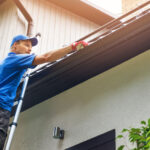 For homeowners with hardwood flooring, a little bit of in-home water can do a whole lot of damage. Over prolonged periods of time, water can warp, buckle, and/or cup hardwood flooring, leading to an expensive and time-consuming repair process. Not all warped woodwork requires replacement, though. Some warped floors can be fixed as a DIY project using nothing but a dehumidifier and time. The key is to identify — and rectify — the water damage issue quickly.
For homeowners with hardwood flooring, a little bit of in-home water can do a whole lot of damage. Over prolonged periods of time, water can warp, buckle, and/or cup hardwood flooring, leading to an expensive and time-consuming repair process. Not all warped woodwork requires replacement, though. Some warped floors can be fixed as a DIY project using nothing but a dehumidifier and time. The key is to identify — and rectify — the water damage issue quickly.
Your first step is to dry all water-damaged areas thoroughly.
Using absorbent towels, remove traces of moisture from the damaged floor’s surface. For standing water problems, use a water vacuum. If water entered the affected room by seeping through a wall, or falling through a ceiling, for example, make sure the water’s source has been identified and “plugged”.
Next, rent or buy a dehumidifier.
A dehumidifier is a small, household appliance meant to reduce humidity in the air. Dehumidifiers are often used for health reasons but, in the case of water-damaged flooring, a dehumidifier can help to extract water from wood planks, returning the wood to its original, non-warped form more quickly.
With the above steps completed, if the warping persists, plan to wait. It may take a week, a month, or longer, but — eventually — for all but the most damaged flooring, your hardwood will return to shape. Expect the process to happen more quickly during winter as the wood contracts in colder, drier air.
Lastly, if your floors have been damaged as a result of heavy rains or water entering your home from the outside, consider a professional inspection to identify how and why the damage occurred. Your gutter may be clogged, for example, which can result in overflows which can damage your home’s foundation.
It can be labor-intensive to dry your wood floors. Compared to the cost of replacement, however, calling this a DIY can be sensible.



